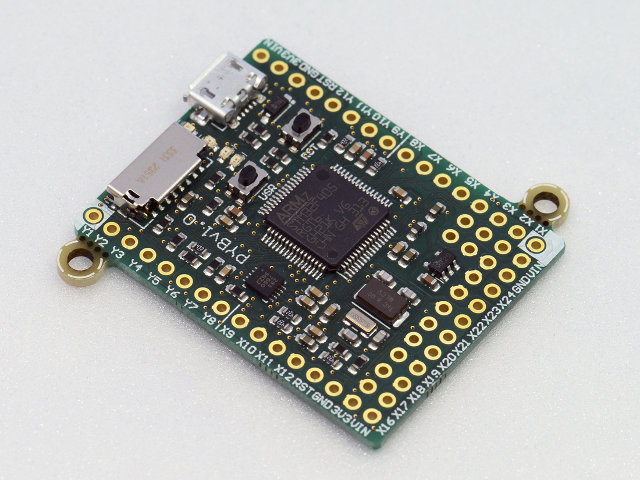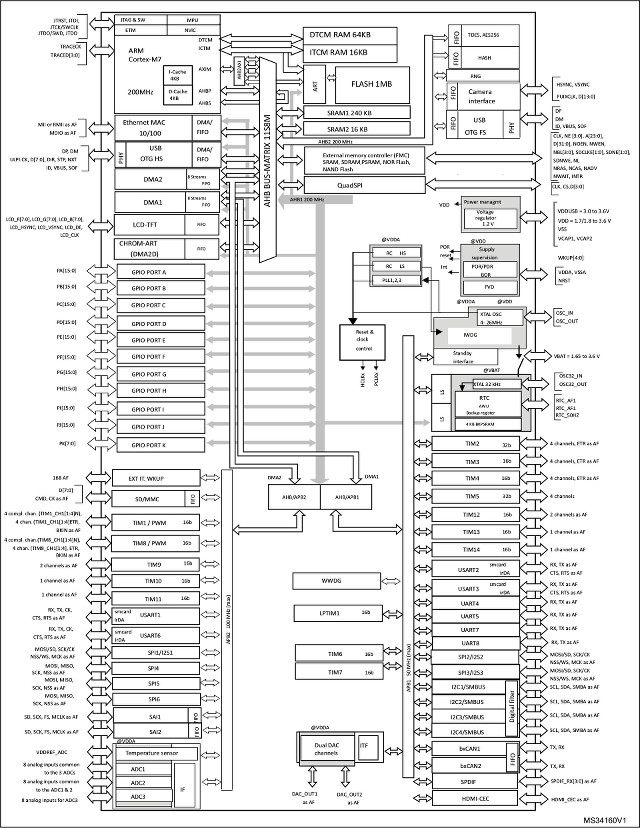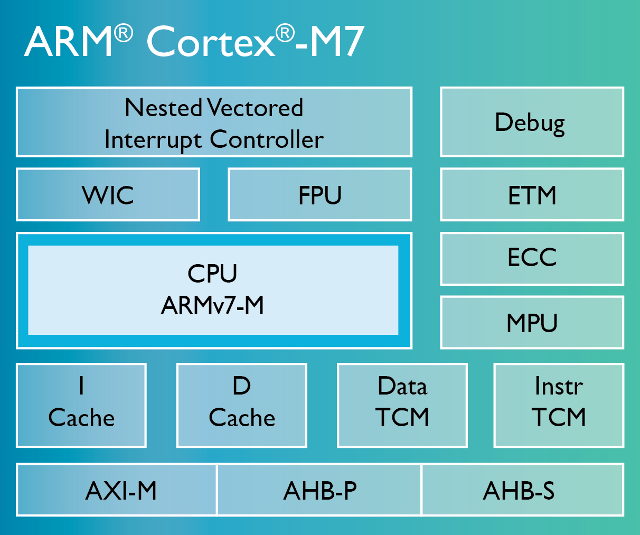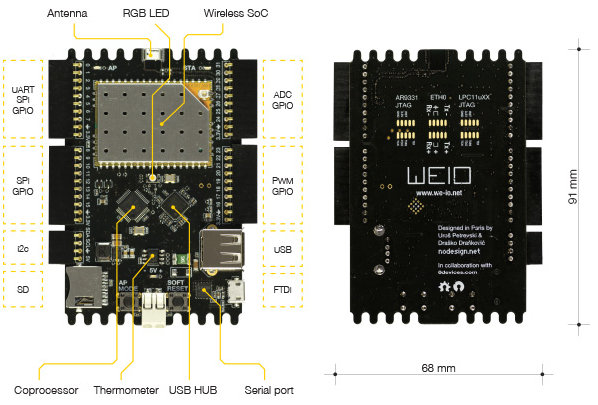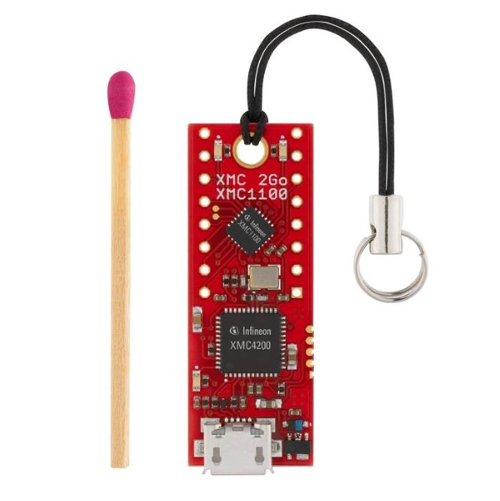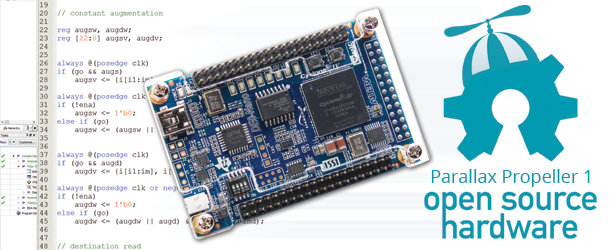ARM and MIPS are not the only games in town with it comes to 32-bit cores for micro-controllers. I’ve already written about Beyond Semiconductor, and mentioned Andes used in some Wi-Fi SoC, and today I’ve come across another IP company called Cortus. which just introduced APS23 and APS25 cores based on their latest Cortus V2 instruction set. which offers a smaller code footprint compared to there V1 ISA. APS23 can achieve 1.44 Coremarks/MHz, 2.83 DMIPS/MHz, and can run up to 200 MHz when manufactured with 90nm process, whereas APS25 is a bit more powerful with 2.09 Coremarks/MHz, 2.36 DMIPS/MHz, and can run up to 344 MHz. Minimal power consumption is 11.6 and 19.3 uW/Mhz for APS23 and APS25 respectively. Key features of both cores include: APS23 APS25 Excellent Code Density 3 stage pipeline 5-7 Stage Pipeline Sequential Multiplier High Performance Integer Multiply Optional Parallel Multiplier (Gives 2.62 Coremakes/MHz) Integer Divider Full Peripheral Set Dual […]
Pyboard MicroPython ARM Cortex M4 Board is Now Available for $45
MicroPython is both a lightweight implementation of Python 3.4 programming language, and a board, aka pyBoard, based on STMicro STM32F4 ARM Cortex M4 micro-controller running Micro Python. The project had a successful Kickstarter campaign in 2013, and they’ve completed shipment of the perks to their backers last June. The company has now launched its own store, so let’s see the progress of the project. The board has been re-designed since Kickstarter campaign, but the specifications remains the similar, but with some extra I/Os exposed: MCU – STMicro STM32F405RG micro-controller @ 168 MHz with 1MB flash, 192KB RAM, and an FPU. External Storage – Micro SD card slot, supporting standard and high capacity SD cards Expansion Headers: 24x GPIO on left and right edges and 5x GPIO on bottom row, plus LED and switch GPIO available on bottom row 3x 12-bit analog to digital converters, available on 16 pins, 4 with […]
STMicro STM32F7 Series is the First ARM Cortex-M7 MCU Family
Right after ARM’s Cortex-M7 announcement, STMicro has listed STM32F7 MCU family based on the latest ARM core on their website. The family is comprised of 20 different MCUs with various flash size, packages, and with or without a crypto/hash coprocessor. The company expects their STM32F756xx microcontrollers to be used for motor drive and application control, medical equipment, industrial applications such as PLC, inverters, and circuit breakers, printers & scanners, alarm systems, video intercom, HVAC, home audio appliances, mobile applications, Internet of Things application, and wearable devices such as smartwatches. STM32F7 MCUs share the following key features: Cortex-M7 core @ 200 Mhz (1000 CoreMark/428 DMIPS) with L1 cache (4KB I-cache, 4KB d-cache) 320KBytes of SRAM with scattered architecture: 240 Kbytes of universal data memory a 16 Kbytes partition for sharing data over the bus matrix 64 Kbytes of Tightly-Coupled Data Memory (DTCM) for time critical data handling (stack, heap…) 16 Kbytes […]
ARM Introduces Cortex-M7 MCU Core for IoT, Wearables, Industrial and Automotive Applications
ARM has just announced Cortex-M7 processor based on ARMv7-M architecture, with double the compute and digital signal processing (DSP) capability of ARM Cortex M4. The latest ARM MCU core targets IoT and wearables applications for the automotive, industrial, and consumer markets including motor control, industrial / home / factory automation, advanced audio, image processing, connected vehicle applications, and so on. Cortex-M7 comes with enhanced DSP instructions, a better FPU (FPv5 with single and double precision support), and tight coupled memory compared to Cortex-M4, according to an Anandtech article. ARM Cortex-M7 also achieves 5 CoreMark/MHz against 3.41 CoreMark/MHz for Cortex M4, and up to 3.23 DMIPS/MHz against up to 1.95 DMIPS/MHz. ARM Cortex-M7 features listed in the press release: Six stage, superscalar pipeline delivering 2000 Coremarks at 400MHz in a 40LP process. AXI interconnect (supports 64-bit transfer) and fully integrated optional caches for instruction and data allowing efficient access to large […]
WeIO is an Open Source Hardware IoT Board Programmable from a Web Browser (Crowdfunding)
WeIO is an open source hardware board for the Internet of things with Wi-Fi connectivity and lots of I/Os designed by nodesign, a French based startup, in collaboration of 8devices, the makers of the Carambola boards. WeIO is powered by an Atheros AR9331 SoC running OpenWRT as well as an NXP LPC MCU for faster handling of I/Os and support for analog I/Os. One interesting aspect of this board is that it can be programmed via a web browser using HTML5 or Python, and it does not rely on the Cloud to store data. WeIO hardware specifications: SoC – Atheros AR9331 MIPS 24K Wireless SoC @ 400 MHz MCU – NXP LPC11xx ARM Cortex M0 MCU for analog I/O and real-time H/W interfaces System Memory – 64 MB DDR2 Storage – 16 MB flash + micro SD slot Connectivity – 802.11 b/g/n Wi-Fi with on-board antenna (AP and STA modes), […]
Infineon XMC 2Go Cortex M0 Development Kit Sells for 5 Euros
Infineon brought another tiny, portable, and cheap ARM Cortex M0 board to market with XMC 2Go development kit featuring XMC1100 ARM Cortex M0 micro-controller with 16KB RAM, 64KB Flash, and tow breadboard friendly headers to access various serial interfaces and ADC pins. Key features listed on Infineon website: MCU – Infineon XMC1100 ARM Cortex-M0 MCU @ 32 MHz with 64KB flash, 16KB RAM. Debugger – On-board J-Link Lite Debugger using an XMC4200 Microcontroller. Headers – 2×8 pin headers suitable for Breadbord with access to 2x USIC (Universal Serial Interface Channel: UART, SPI, I2C, I2S, LIN), 6x 12-bit ADC, external interrupts (via ERU), 4x 16-bit timers Misc – 2 x user LED, RTC Power – 5V Micro via USB, or 3.3V external power. ESD and reverse current protection Dimensions – 14.0 x 38.5 mm The board is programmed via USB using the same Dave IDE I tried with XMC4500 Relax […]
Parallax Propeller 1 P8X32A Open Source Multi-core MCU
Lots of electronics devices are now powered by open source software such as Linux, open source hardware is not as wide-spread, but gaining tracking traction thanks to the like of Arduino, Beagleboard.org, Olimex, and many projects on crowdfunding websites, and now we even start seeing some open source silicon. Existing open source processors include LEON3 (SparkV8) MCU, OpenRisc, and just very recently, LowRISC, based on 64-bit RISC-V instruction set architecture, has been announced with the backing of some of Raspberry Pi co-founders, Google ATAP, etc… and is currently being developed at the University of Cambridge, UK. Parallax Propeller 1 P8X32A is another MCU which has been open sourced last week. Propeller 1 P8X32A had however been released in April 2006, and can be sourced as a 40-pin DIP chip for prototyping, and 44-pin QFP and QFN for production, and come with the following key features: Power Requirements: 3.3 VDC […]
ARM TechCon 2014 Schedule – 64-Bit, IoT, Optimization & Debugging, Security and More
ARM Technology Conference (TechCon) 2014 will take place on October 1 – 3, 2014, in Santa Clara, and as every year, there will be a conference with various sessions for suitable engineers and managers, as well as an exposition where companies showcase their latest ARM based products and solutions. The detailed schedule for the conference has just been made available. Last year, there were 90 sessions organized into 15 tracks, but this year, despite received 300 applications, the organizers decided to scale it down a bit, and there will be 75 session in the following 11 tracks: Chip Implementation Debugging Graphics Heterogeneous Compute New Frontiers Power Efficiency Safety and Security Software Development and Optimization Software Optimization for Infrastructure and Cloud System Design Verification There are also some paid workshops that take all day with topics such as “Android (NDK) and ARM overview”, “ARM and the Internet of Things”, or “ARM […]



